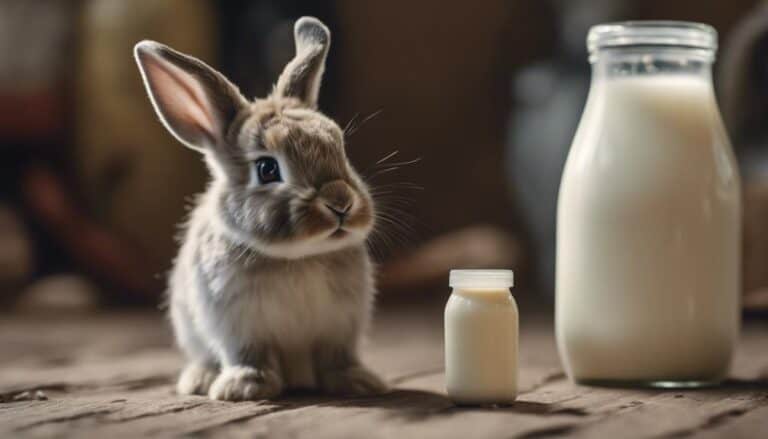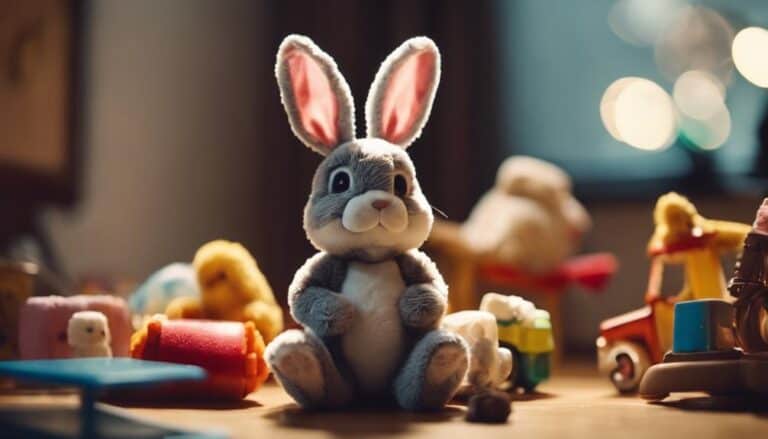Rabbits are one of the few mammals that can't vomit. This is pretty interesting because it says a lot about their digestive system.
So, have you ever wondered why they can't do something that lots of other animals can do?
Understanding why rabbits can't vomit helps us learn more about the special ways they're adapted to be delicate herbivores.
Contents
- 1 Key Takeaways
- 2 Rabbit Anatomy Prevents Vomiting
- 3 Sphincter Function in Rabbits
- 4 Comparison With Rodents' Digestive System
- 5 Implications of No Vomiting Ability
- 6 Rabbit Vs. Rodent Digestive Differences
- 7 Consequences of Blocked Vomiting Mechanism
- 8 Understanding Rabbit Digestive Health
- 9 Potential Risks Without Vomiting Ability
- 10 Managing Digestive Issues in Rabbits
- 11 Conclusion
Key Takeaways
Rabbits are quite different from other animals when it comes to vomiting. In fact, they're physically unable to vomit due to their unique anatomy.
One reason for this is the tight esophageal sphincter and tilted esophagus they have. This combination makes it impossible for food to come back up once it's gone down.
This inability to vomit can lead to some serious health issues, like gastrointestinal stasis and poisoning. If a rabbit eats something toxic, it can't expel it like other animals would.
The rabbit's digestive system is also quite unique. Instead of focusing on the stomach, it's centered around the cecum and large intestine. This means that the stomach isn't the main player in their digestion process.
The sphincter muscle plays a crucial role in preventing rabbits from vomiting. It's essentially a strong muscle that keeps everything moving in one direction – down, not up. This is why rabbits can't vomit, even if they need to.
Rabbit Anatomy Prevents Vomiting

Rabbits have a unique anatomy that prevents them from vomiting. Once they eat something, it stays in their digestive system because of their physical characteristics.
Their esophagus is tilted, their esophageal sphincter is tight, and they don't have a gag reflex. All these things together make it impossible for them to throw up.
Unlike many other animals, rabbits can't regurgitate their food because of how their digestive system is structured. They've weak diaphragm muscles and stomach muscles, which makes vomiting almost impossible.
On top of that, they don't have a gag reflex, which is what triggers the body to get rid of harmful substances. This lack of a gag reflex makes it even clearer that rabbits can't vomit.
This special anatomy is perfect for eating large amounts of low-quality food.
Their digestive system is designed to do most of its work in the cecum and large intestine, rather than the stomach. This means that vomiting would be pointless for rabbits.
As a result, they're more likely to have digestive problems like gastrointestinal stasis. This shows just how important their anatomy is to their overall health.
Sphincter Function in Rabbits
Rabbits have a special muscle in their digestive system called a sphincter. It's super important because it stops them from vomiting. This muscle acts like a one-way plug between their stomach and throat, so food can only go down, not back up.
This is really helpful for rabbits because they eat a lot of low-quality food.
Without this special muscle, they wouldn't be able to digest their food properly.
Rabbit's Unique Anatomy
Rabbits have a special anatomy that helps prevent stomach contents from coming back up into the esophagus. This is thanks to a sphincter, a muscle that acts like a valve, located where the esophagus meets the stomach. It's surrounded by a special fold of mucous membrane that lets food and liquids into the stomach but blocks anything from flowing back up into the esophagus.
Unlike rodents, rabbits have strong muscles that make vomiting very difficult. The esophagus muscle in rabbits can only push substances towards the stomach, and the stomach muscle can't override this one-way direction.
This means that rabbits can't easily get rid of harmful substances from their stomach, which can lead to a serious condition called gastrointestinal stasis. This can be fatal for rabbits if they can't expel the bad stuff from their stomach due to their unique anatomy.
Digestive System Implications
Rabbits have a unique digestive system that's designed to handle a lot of low-quality food.
To understand how it works, you need to know about the special muscle called the sphincter that's located between the esophagus and stomach. This strong muscle acts like a one-way plug, making sure that food and liquids only go into the stomach and not back up into the esophagus. This means rabbits can't vomit, which is different from rodents.
This design is crucial because rabbits are meant to eat a lot of food that's not very nutritious. If they could vomit, they'd be at risk of getting reflux, which could be dangerous. On the other hand, not being able to vomit means rabbits are more likely to get intestinal blockages or poisoning if they eat something bad.
That's why it's so important for owners to keep a close eye on what their rabbits are eating and make sure they're not getting into anything they shouldn't be.
Rabbits are really prone to gastrointestinal problems, so their owners need to be vigilant to make sure their digestive tract is working smoothly.
This means monitoring their diet and environment closely to prevent conditions like GI stasis. With a little care and attention, you can help your rabbit stay healthy and happy.
Comparison With Rodents' Digestive System
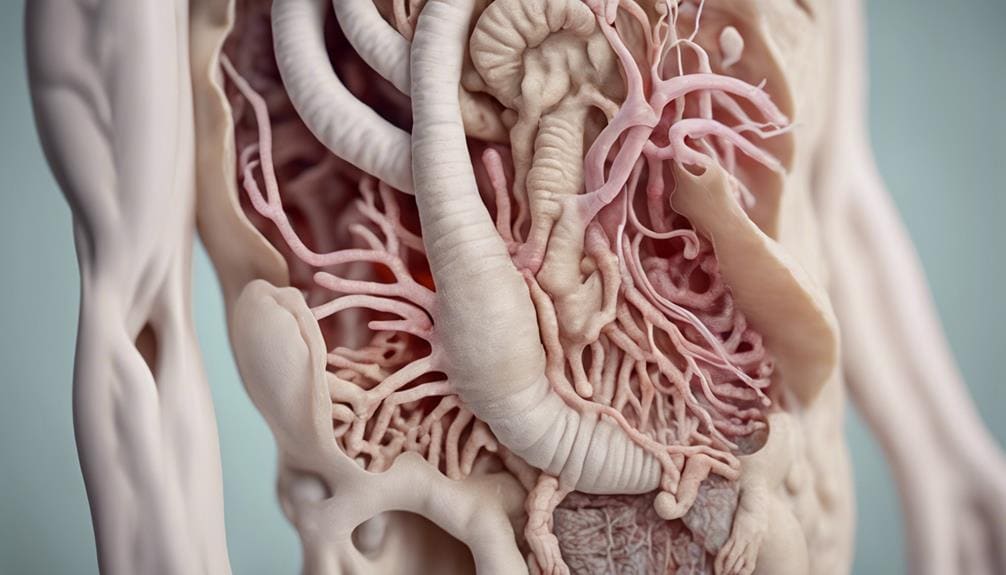
So, when we compare the digestive system of rabbits to that of rodents, like mice and rats, it's clear that there are some big differences in how they process food and absorb nutrients.
One major difference is that rodents can vomit when they need to, which is a protective mechanism that helps them get rid of harmful substances quickly. Rabbits, on the other hand, can't vomit because of their unique digestive anatomy.
Behavioral studies have shown that rodents tend to eat a wider variety of foods than rabbits. Rodents have a more flexible digestive system that can handle occasional toxic substances by regurgitating them.
In contrast, rabbits have a specialized digestive process that involves a unique hindgut fermentation system. This system lets rabbits efficiently extract nutrients from fibrous plant materials, but it also means they've to be super careful about what they eat.
Since they can't vomit, they need to avoid ingesting harmful substances altogether.
Implications of No Vomiting Ability
Rabbits can't vomit, which means they're more likely to get sick from gastrointestinal problems like stasis, blockages, and poisoning.
This is because they can't get rid of bad food or toxins like we can.
So, it's crucial to keep a close eye on your rabbit's digestion.
Make sure they're eating a balanced diet and getting regular exercise.
This can help prevent problems from occurring in the first place.
Because rabbits have a unique digestive system, it's essential to take proactive care of them.
If you notice any signs of illness, don't hesitate to take your rabbit to the vet.
Timely intervention can make a huge difference in their health and wellbeing.
Digestive System Differences
Rabbits have a unique digestive system that's quite different from many other animals. One key difference is that they're unable to vomit. This mightn't seem like a big deal, but it has significant implications for their health and wellbeing.
The reason rabbits can't vomit is due to their anatomy. Their esophagus is tilted, their esophageal sphincter is tight, and there's a thick fold of tissue surrounding their stomach. All of these features prevent food from moving backward, so they can't expel the contents of their stomach like other animals can.
Because they can't vomit, rabbits have to rely on their digestive system to process and eliminate food efficiently. They've evolved to eat large quantities of low-quality food, and their digestive system is designed to move food through quickly. However, this design also makes them prone to digestive issues like gas and blockages.
As a result, it's crucial for rabbit owners to monitor their pet's diet and environment carefully. If they don't, their rabbit might develop serious health complications, such as intestinal blockages or poisoning. By understanding these digestive system differences, owners can take steps to keep their rabbits healthy and thriving.
Health Complications Risk
Rabbits are at a higher risk of serious health problems because they can't vomit. This means they're more likely to get gastrointestinal complications that can be severe and even life-threatening if not treated right away.
One major concern is digestive problems, like gastrointestinal stasis, intestinal blockages, and poisoning. These can be fatal if not addressed promptly.
Gastrointestinal stasis is particularly worrying because it can slow down or even stop the movement of food through the gut, leading to pain, dehydration, and even death if not treated quickly.
Another issue is that rabbits can't get rid of toxic substances from their stomach, which makes them more prone to poisoning.
This means they need to see a vet right away if they show any signs of digestive problems.
It's crucial for rabbit owners to keep an eye out for any signs of distress and get their pets to a vet at the first sign of trouble to prevent serious health complications.
Dietary Considerations Importance
Rabbits are super sensitive when it comes to their digestive system. Because they can't vomit, what they eat can really affect their health. So, it's crucial to get their diet just right.
For starters, rabbits need a diet that's high in fiber and low in protein. That's because their digestive system is really sensitive, and they need the right foods to keep it running smoothly. A balanced diet is key to preventing health issues like gastrointestinal stasis.
One of the best things you can do for your rabbit is to feed them high-quality hay, like timothy hay. This should make up the bulk of their diet, as it helps prevent digestive problems and supports overall health. Fresh veggies and fruits are okay too, but only in moderation – no more than 10% of their diet. You don't want to introduce too much sugar and water into their system.
Rabbit pellets, on the other hand, are a no-no. They're high in sugar and low in fiber, which can cause digestive issues and even obesity. And don't forget to provide fresh water at all times, changing it frequently to keep your rabbit hydrated and their digestive system in balance.
Rabbit Vs. Rodent Digestive Differences
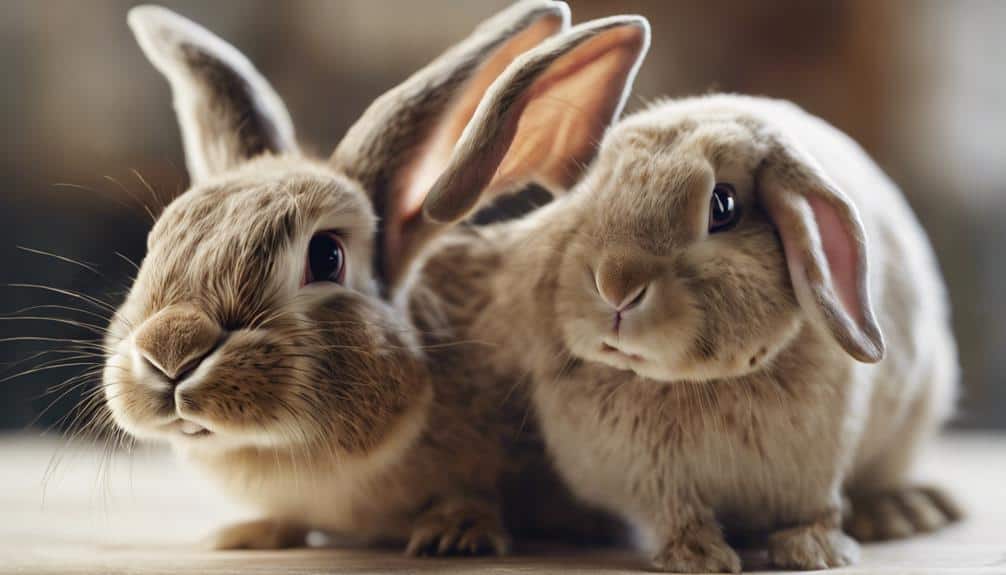
Rabbits have a unique gastrointestinal setup that sets them apart from typical rodents. For one, rabbits can't vomit due to their physiology. Their digestive system is designed in a way that prevents the backward flow of food once it has entered the stomach, which means the Heimlich Maneuver wouldn't work for rabbits if they're choking.
Rabbits have a hindgut fermentation digestive system, similar to horses. This means that fermentation of fibrous material happens in the cecum, which allows them to extract more nutrients from their diet of grasses and hay.
On the other hand, rodents typically have a simpler digestive system that doesn't rely on hindgut fermentation. This difference in digestive mechanisms between rabbits and rodents is really important to understand, because it affects their unique dietary requirements and digestive processes. If you want to take good care of these animals and give them the right nutrition, you need to know how their bodies work.
Consequences of Blocked Vomiting Mechanism
Rabbits can't vomit, and that's a big deal. It's not just their digestive system that's affected – it can also lead to some serious health problems.
Because rabbits can't throw up, any blockages or issues in their gut can quickly get out of hand.
One common problem in rabbits is something called gastrointestinal stasis. This is when their digestive system slows down or comes to a complete stop. This often happens because they can't get rid of stuff they can't digest by vomiting it up.
Without vomiting, rabbits are more likely to get severe complications like blockages in their intestines or even poisoning.
Another issue is that gas can build up in their digestive system, which is painful and can make gastrointestinal stasis even worse.
Rabbit owners need to keep a close eye on their pets for signs of distress, because they're more prone to life-threatening conditions if they can't vomit.
If you notice any symptoms of gastrointestinal stasis, it's crucial to get your rabbit to a vet right away to prevent more health problems.
Understanding Rabbit Digestive Health
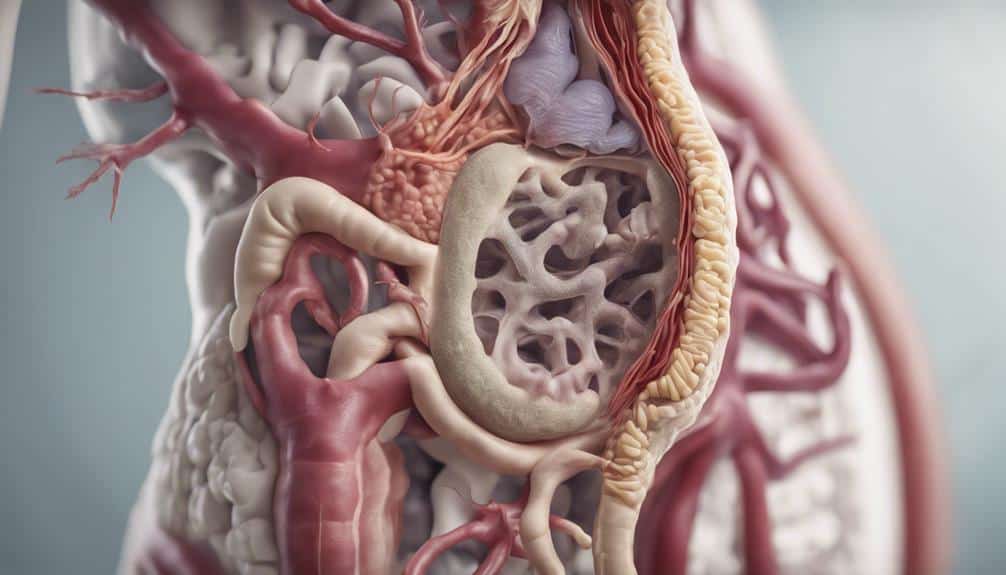
Rabbit digestive health is pretty unique because of their anatomy. Unlike many other animals, rabbits can't vomit. This means that if they eat something that doesn't agree with them or is bad for them, they can't get rid of it by throwing up.
The reason they can't vomit is because of the way their body is structured. They've a tilted esophagus, a tight esophageal sphincter, and a thick fold of tissue around their stomach. All of these things make it impossible for them to vomit.
Because they can't vomit, it's super important to make sure they're eating the right foods. Rabbits are more likely to get blocked intestines or poisoned if they eat something bad, so we need to be careful about what they eat.
Giving them a balanced diet that's safe for them is crucial for keeping them healthy.
Regular check-ups with the vet, along with providing them with high-quality food and opportunities to exercise, can help prevent digestive problems and keep them overall healthy.
Potential Risks Without Vomiting Ability
Rabbits are at risk when it comes to their digestive health because they can't vomit. This means they face some serious dangers.
One of the biggest risks is gas building up in their stomach. Since they can't throw up, this gas can cause a lot of pain and even lead to serious health issues like gastrointestinal stasis.
Their stomach anatomy also makes them prone to intestinal blockages. If these blockages aren't taken care of right away, they can be life-threatening. This is because rabbits can't vomit to get rid of whatever is causing the blockage.
Another risk is that rabbits are more vulnerable to poisoning. If they eat something toxic, like certain plants, they can't get rid of it out of their system by vomiting. This makes them more likely to get sick from toxins.
Finally, rabbits are more likely to get gastrointestinal stasis because of their unique digestive system and inability to vomit. This condition can be fatal if it's not treated quickly.
It's crucial for rabbit owners to be aware of these risks and take steps to prevent them. This means keeping an eye out for poisonous plants and making sure their rabbits have a healthy digestive system through a good diet and proper care.
Managing Digestive Issues in Rabbits
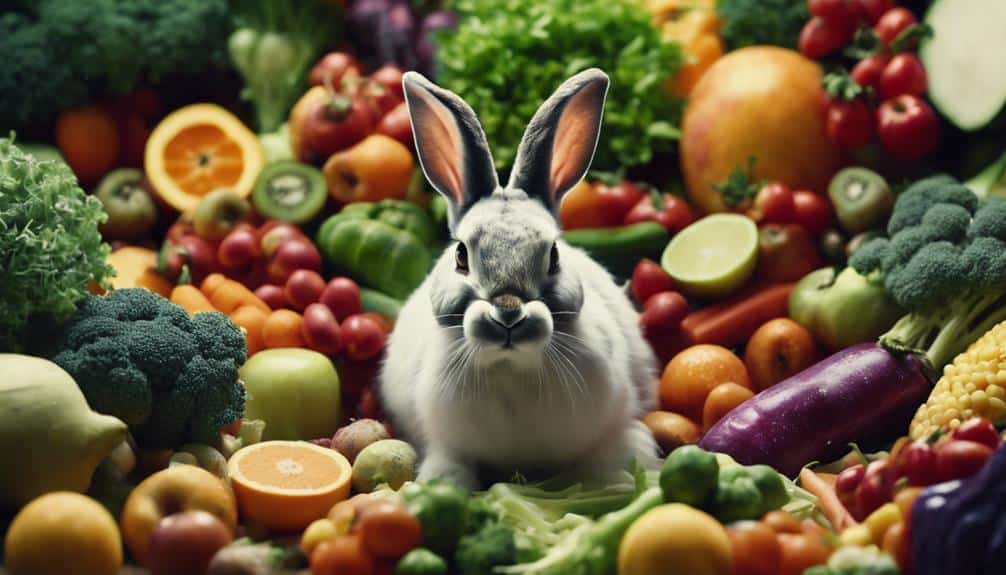
When it comes to managing digestive issues in rabbits, their unique dietary needs take center stage. Since they can't vomit, they're more prone to serious problems like gastrointestinal stasis and enteritis. So, it's crucial to keep a close eye on what they eat to avoid intestinal blockages and poisoning.
Rabbits have a delicate digestive system that relies on eating a lot of low-quality food. Their hindgut fermentation process mainly happens in the cecum and large intestine. This means it's easy for gas to build up, causing pain and potentially leading to gastrointestinal stasis. That's why regular vet check-ups are a must.
As a rabbit owner, you play a vital role in maintaining your pet's digestive health. Provide a safe environment, monitor for any signs of illness, and seek vet care promptly when needed. By understanding and addressing these unique digestive needs, you can help your rabbit live a happy and healthy life.
Conclusion
So, you're wondering why your rabbit can't vomit, right? Well, it's all about their unique anatomy. You see, their digestive system is designed to absorb nutrients as efficiently as possible, which is great for them, but it also means they can't throw up like we do.
This specialized design comes with some risks, though. Since they can't get rid of bad food or toxins by vomiting, it's crucial to manage their digestive health carefully. That means you need to be extra vigilant to prevent potential issues.
Just like your rabbit's inability to vomit, your attention and care are vital in keeping them healthy and happy. So, next time you see your furry friend munching away, remember that their special digestive system needs your special care.




